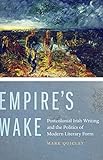Empire's Wake : Postcolonial Irish Writing and the Politics of Modern Literary Form / Mark Quigley.
Material type: TextPublisher: New York, NY : Fordham University Press, [2012]Copyright date: ©2012Description: 1 online resource (264 p.)Content type:
TextPublisher: New York, NY : Fordham University Press, [2012]Copyright date: ©2012Description: 1 online resource (264 p.)Content type: - 9780823245444
- 9780823245475
- English literature -- Irish authors -- History and criticism
- Modernism (Literature)
- Postcolonialism in literature
- Literary Studies
- Postcolonial Studies
- LITERARY CRITICISM / European / English, Irish, Scottish, Welsh
- Angela’s Ashes
- Blasket
- Celtic Tiger
- Frank McCourt
- Ireland
- Irish Literary Revival
- Irish
- J.M. Synge
- James Joyce
- Samuel Beckett
- Sean O’Faolain
- W.B. Yeats
- empire
- modernism
- postcolonial
- 820.9/9415 23
- PR8755 .Q54 2013
- online - DeGruyter
| Item type | Current library | Call number | URL | Status | Notes | Barcode | |
|---|---|---|---|---|---|---|---|
 eBook
eBook
|
Biblioteca "Angelicum" Pont. Univ. S.Tommaso d'Aquino Nuvola online | online - DeGruyter (Browse shelf(Opens below)) | Online access | Not for loan (Accesso limitato) | Accesso per gli utenti autorizzati / Access for authorized users | (dgr)9780823245475 |
Frontmatter -- Contents -- Acknowledgments -- Introduction. Rerouting Irish Modernism: Postcolonial Aesthetics and the Imperative of Cosmopolitanism -- 1. Modernity’s Edge: Speaking Silence on the Blaskets -- 2. Sean O’Faoláin and the End of Republican Realism -- 3. Unnaming the Subject: Samuel Beckett and Postcolonial Absence -- 4. Postmodern Blaguardry: Frank McCourt, the Celtic Tiger, and the Ashes of History -- Conclusion. Dispatches from the Modernist Frontier: “European and Asiatic papers please copy” -- Notes -- Works Cited -- Index
restricted access online access with authorization star
http://purl.org/coar/access_right/c_16ec
Shedding new light on the rich intellectual and political milieux shaping the divergent legacies of Joyce and Yeats, Empire’s Wake traces how a distinct postcolonial modernism emerged within Irish literature in the late 1920s to contest and extend key aspects of modernist thought and aesthetic innovation at the very moment that the high modernist literary canon was consolidating its influence and prestige.By framing its explorations of postcolonial narrative form against the backdrop of distinct historical moments from the Irish Free State to the Celtic Tiger era, the book charts the different phases of 20th-century postcoloniality in ways that clarify how the comparatively early emergence of the postcolonial in Ireland illuminates the formal shifts accompanying the transition from an age of empire to one of globalization.Bringing together new perspectives on Beckett and Joyce with analyses of the critically neglected works of Sean O’Faoláin, Frank McCourt, and the Blasket autobiographers, Empire’s Wake challenges the notion of a singular “global modernism” and argues for the importance of critically integrating the local and the international dimensions of modernist aesthetics.
Mode of access: Internet via World Wide Web.
In English.
Description based on online resource; title from PDF title page (publisher's Web site, viewed 03. Jan 2023)


